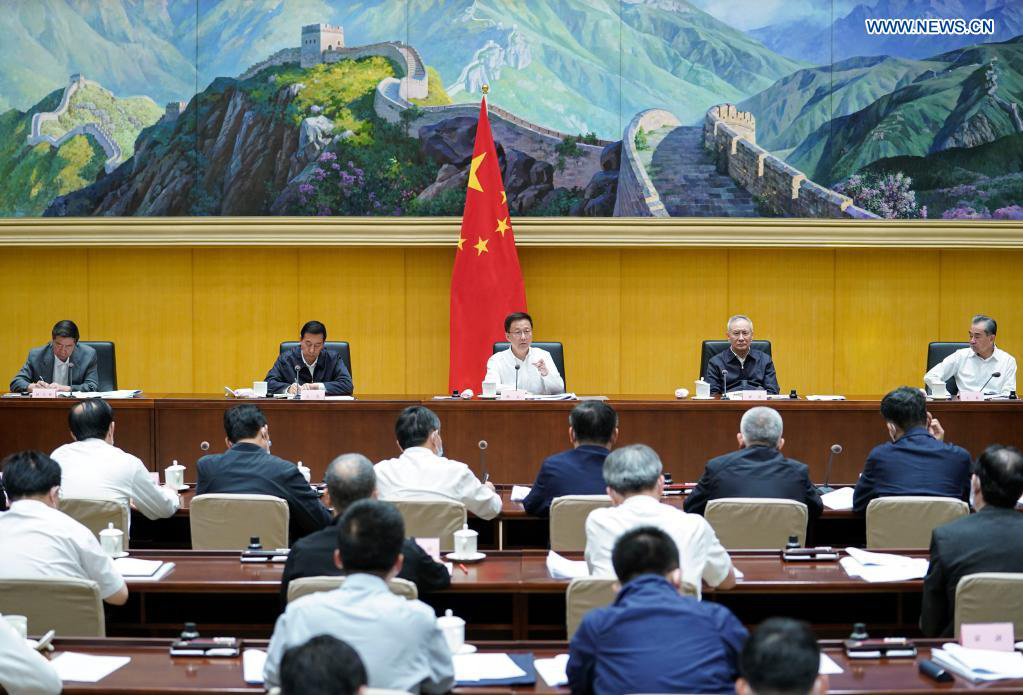
Explainer: China creates new ‘leaders group’ to help deliver its climate goals
Xiaoying You
06.03.21Xiaoying You
03.06.2021 | 8:00amChina’s state media has provided the first details about a new high-level climate “leaders group” formed to direct the country’s emission-reducing efforts.
A short news clip of the group’s first plenary meeting released last Thursday shows dozens of officials taking notes as China’s vice premier, Han Zheng, instructs them to ensure the nation “peaks” its carbon emissions before 2030 and achieves “carbon neutrality” before 2060.
The climate “leaders group” has been established and will be supervised by the central government and comprises the heads of key national-level ministries and agencies, according to Chinese reports and Carbon Brief sources.
One expert tells Carbon Brief that the founding of the group is a “milestone” in China’s pursuit of its climate goals. Another says it sends out the message that the 2030 and 2060 carbon targets “must be achieved”.
In this article, Carbon Brief explains who is in the group, what their first meeting was about and why it is important for China’s climate goals.
Who is in the leaders group?
The leaders group made its public debut in a two-minute report aired during prime-time news on China’s state broadcaster CCTV last Thursday. The official channel said that the group, which was introduced as “the leaders group for the works of carbon peaking and carbon neutrality”, had gathered for its first plenary meeting in Beijing the day before.
A CCTV video shows vice premier Han hosting the conference as he addresses around 60 mask-donning officials.
Although CCTV only mentioned Han’s role in this particular meeting, Carbon Brief understands the arrangement means that Han, one of the most senior officials in the central government, is in charge of the leaders group.
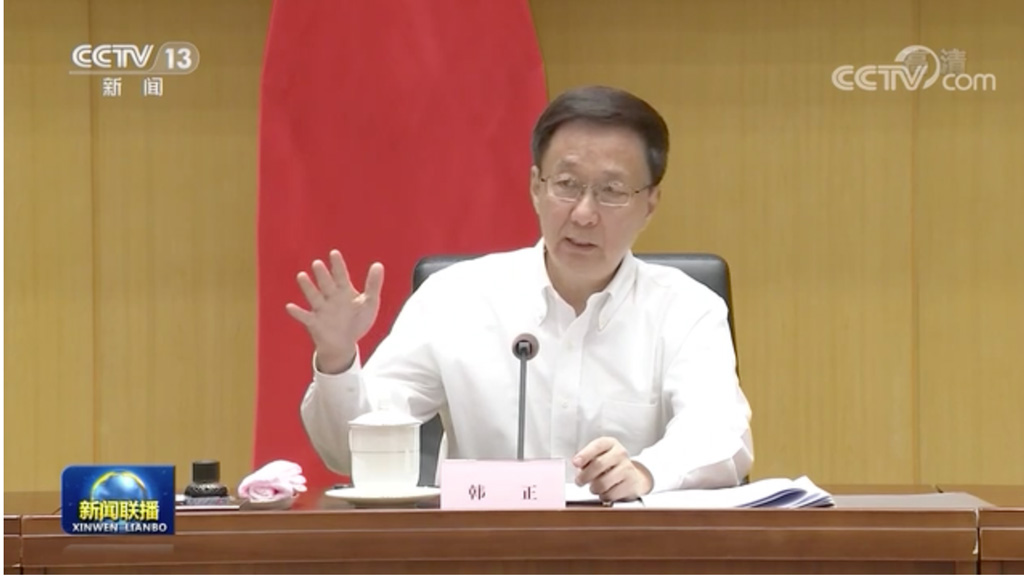
Han is a member of the Standing Committee of the Politburo of the Communist Party of China (CPC), which is the seven-member organ that makes the most significant decisions in the country. Formerly the party chief and mayor of Shanghai before being promoted to serve in the central government, Han has been overseeing China’s climate and environment-related initiatives in recent years.
Among other titles, Han is the head of the Central Ecological and Environmental Inspection Team (CEEIT), an institution formed and run by China’s top leaders to ensure the implementation of ecological and environmental regulations. (See Carbon Brief’s recent article about the significance of CEEIT.)
In January, Han attended the Climate Adaptation Summit 2021 virtually and delivered a speech. In April, John Kerry, the US special presidential envoy for climate, travelled to Shanghai to meet his counterpart, Xie Zhenhua, for climate talks. But it was not until after Kerry met with Han via video link that the two nations published a joint statement on climate change cooperation.
Apart from Han, four other key officials attended the group’s first plenary meeting and gave speeches, according to state news agency Xinhua. They were vice premier Liu He who looks after the country’s economy and was the chief negotiator in the US-China trade talks, State Council member Wang Yong, foreign minister Wang Yi, plus director of the National Development and Reform Commission (NDRC), He Lifeng. The CCTV report showed the four officials sitting on a top table, two on each side of Han.
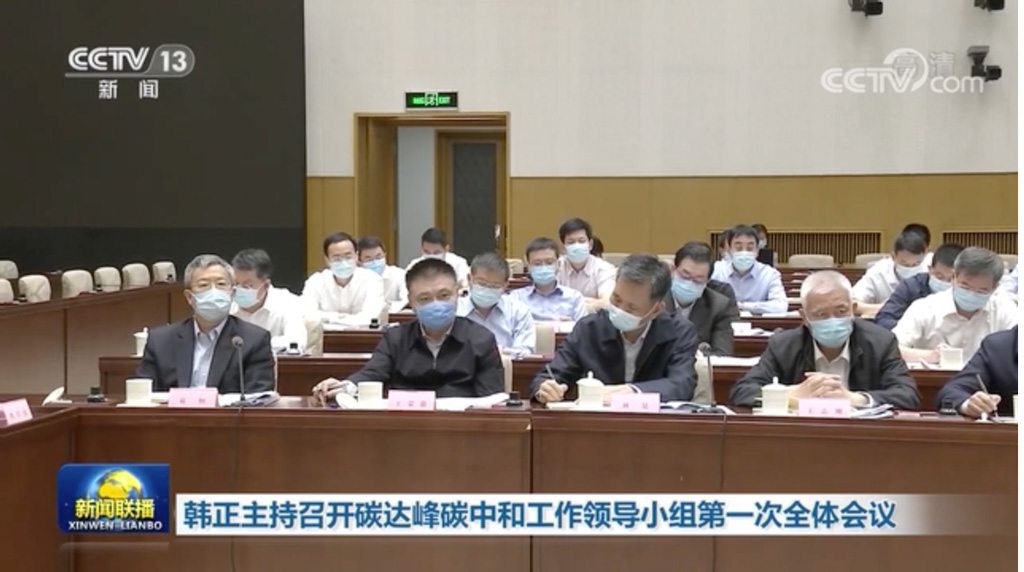
Neither CCTV nor Xinhua gave further information on the participants of the plenary meeting. But Yicai, a state-affiliated financial outlet, recognised some of them after watching the CCTV news clip.
Yicai reported that the meeting’s audience included the heads of “almost all key ministries and committees”, such as minister of finance Liu Kun, minister of science and technology Wang Zhigang, minister of ecology and environment Huang Runqiu and governor of China’s central bank Yi Gang.
Sign up to Carbon Brief's free "China Briefing" email newsletter. All you need to know about the latest developments relating to China and climate change. Sent to your inbox every Thursday.
Some other attendees named were Xie Zhenhua, China’s special envoy for climate, Ning Jizhe, director of the National Bureau of Statistics and Wang Jun, who takes charge of tax policies. The ministers of construction, industry and information technology, natural resources, transport, commerce – among others – were also present, Yicai stated.
The website said the leaders group’s debut was a “significant step forward” in the country’s efforts to reach its “dual-carbon” goals – a term referring to president Xi Jinping’s 2030 and 2060 emission targets.
Dimitri de Boer, a Beijing-based environmental cooperation expert, tells Carbon Brief:
“This [leaders] group will be [the] highest governing body in carbon peak and carbon neutrality work in China, [situated] at the very top in the governance structure.”
De Boer is the chief representative of ClientEarth’s China office, a charity that supports the Chinese government’s efforts to strengthen environmental governance and the rule of law.
He says a “leaders group” is a Chinese political management method to deal with “top-level and urgent issues that require coordination from various ministries”.
He expects the new leaders group to coordinate different departments and follow up on developing and implementing key climate strategies, policies and plans.
“This would include, for example, the provincial peaking plans and peaking plans of key sectors,” he notes.
People’s Daily, the official newspaper of the CPC, described the “group mechanism” as a “unique organisational method and working mechanism” in China’s political governance system. The official outlet said that a typical “group” comprises the leaders, several departments and an “administrative organ” in charge of implementing decisions.
What was its first meeting about?
According to Xinhua’s report of the first plenary meeting, Han ordered the meeting’s participants to “fully implement” the development of the “ecological civilisation” – a social developmental goal enshrined in the Chinese constitution and endorsed by president Xi.
Xinhua noted that Han stressed the importance of accomplishing the carbon peak and carbon neutrality goals on schedule. He referred to the goals as “a major strategic decision made – following careful deliberation – by the Party Central Committee with comrade Xi Jinping at the core”.
In addition, Han was quoted directing members of the leaders group to “close in on” the emission targets and “dissect the missions”. Officials should also guide different sectors, industries and regions to set their goals “scientifically” and formulate action plans, Han commanded.
Xinhua’s report said Han demanded that the leaders group “vigorously” ensure the implementation of the decisions and strategies announced by the central government. He called on the group members to “fully use” their coordination capabilities across government organs to ensure they “join forces” to hit China’s emission targets.
Since last Wednesday’s plenary meeting, some group members have taken further actions. He Lifeng, the head of the NDRC, China’s macroeconomic management agency, chaired a follow-up meeting on Friday, according to an official statement. The release said that He relayed the climate-related orders from president Xi, premier Li Keqiang and vice premier Han to members belonging to the “office” department of the leaders group.
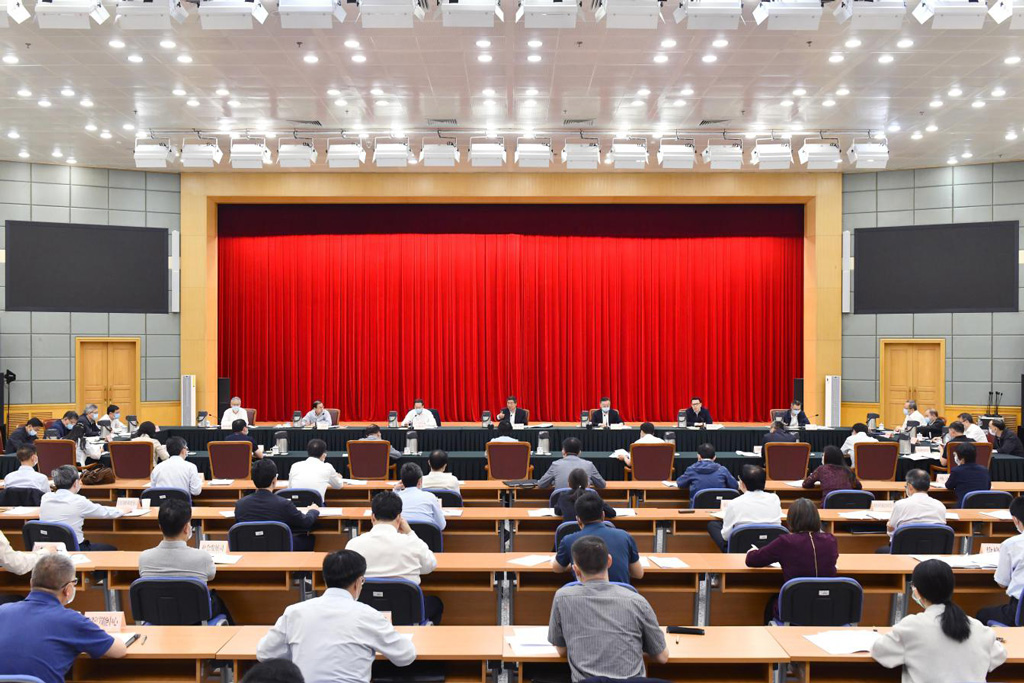
Wu Changhua is a policy analyst specialising in China’s environment, energy, climate change and sustainable development. She tells Carbon Brief that a national leaders group is a “commonly seen” organisation in China to lead and coordinate “focal areas that are of national strategic significance”.
Wu holds various positions, including the chief executive officer of the Future Innovation Centre and China/Asia director of the Office of Jeremy Rifkin. She was named by Time magazine in 2019 as one of “15 women leading the fight against climate change”.
Wu says that the new leaders group chaired by Han signifies that China has ushered in “a nationally united strategy to deliver the 2030 capping CO2 emissions and 2060 carbon neutrality goal”.
China has set up climate-related leaders groups in the past, such as the leaders groups of climate change and energy conservation, initially formed in 2007. Other similar initiatives from the country include the poverty-alleviation and development leaders group and the leaders group for the Covid-19 pandemic.
Wu explains that, over the years, institutional barriers have proved to be an obstacle for the Chinese government to execute the national agenda of establishing “ecological civilisation” effectively and efficiently. She says the new leaders group is “a milestone” in overcoming such barriers.
Why is the group important to China’s climate goals?
Wu notes that the leaders group has gathered the most important and relevant ministries and agencies in China’s climate efforts to “drive through the transformation”.
She points out that its establishment reflects the fact that achieving carbon neutrality is an “economy-wide transformation” and “a systemic restructuring”.
Wu draws up a list of the group’s possible responsibilities, which includes: deciding the country’s roadmap of transition; clarifying policy and regulatory tools and frameworks; influencing the national budget for research and development; and financing the transition.
She says, more importantly, the group would be able to develop and implement a countrywide strategy that “cuts across sectors and regions”.
Wu compares the leaders group to a similar government-led climate “task force” in the US under the Biden administration. She tells Carbon Brief:
“A relevant reference is the US president Biden’s ‘leaders group’ on climate change that is composed of more than 20 secretaries and commissions’ chairs. [They] take on the leadership to advance [Biden’s] climate change agenda and the infrastructure bill.”
She adds that, like other major economies, China is facing “unprecedented” domestic and international challenges in 2021. Therefore, it is “more urgent than ever” for the country to have “a clear, strong and united national strategy” on its climate endeavour.
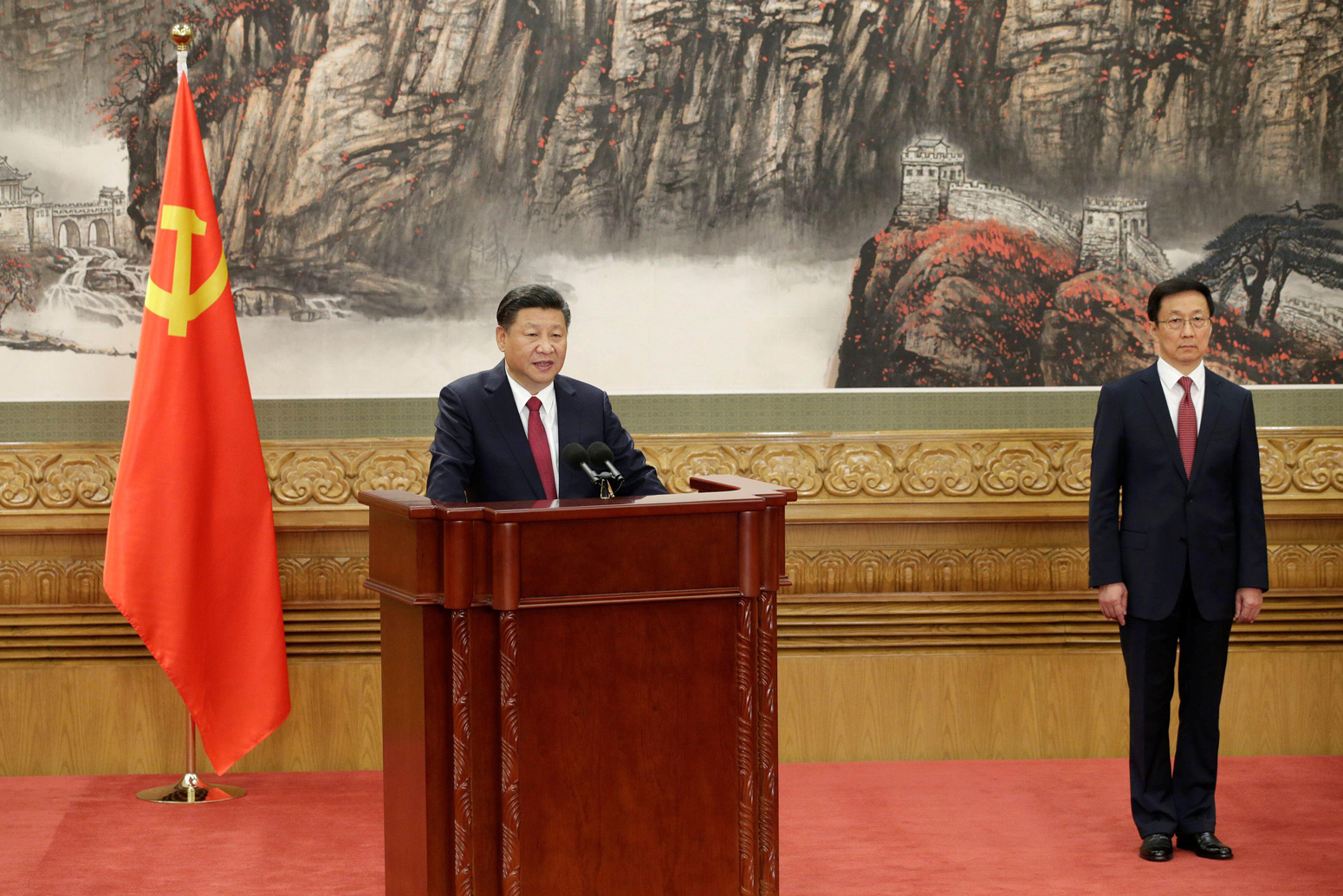
In Prof Yuan Jiahai’s view, the establishment of the leaders group means that the emission peaking and carbon neutrality targets have entered a new stage: “political deployment”.

Prof Yuan, who teaches at the School of Economics and Management of North China Electric Power University, says that the “arduous and long-term nature” of the “dual-carbon” targets call for such a leaders group in China.
He tells Carbon Brief that China’s time frame to achieving carbon neutrality is shorter than that of developed countries – a message president Xi has highlighted previously. In his speech at the Leaders Summit on Climate in April, Xi said: “China has committed to move from carbon peak to carbon neutrality in a much shorter time span than what might take many developed countries and that requires extraordinarily hard efforts from China.”
Prof Yuan says, therefore, China’s “carbon neutrality” target is “more difficult” and would require the continuous backing of a “stable long-term top-level mechanism”. He explains:
“China’s carbon emission volume is huge and still growing. Judging by the present situation, although it is likely that [China] might peak carbon emissions ahead of schedule, whether or not it can peak at a low level will depend on China’s policy control efforts.”
Prof Yuan describes the previous leaders groups of climate change and energy conservation as the “prototype” of China’s climate governance system.
He says, however, as the emission peaking and carbon neutrality goals require balancing between national development and emission reduction, it would need more departments to collaborate – and that is where the new leaders’ group comes in.
Dimitri de Boer also points out the urgency for China to pursue its 2030 and 2060 emission targets, especially amid a post-pandemic economic rebound – part of the reasons why it is important to establish a leaders’ group right now. He explains:
“This is very urgent because some recent reports estimate that China’s carbon emissions may have risen rapidly in the economic recovery from Covid.”
De Boer states that this leaders’ group focuses on carbon emission peaking and carbon neutrality specifically with an objective to ensure that China hits its climate goals “well on time”.
He adds: “The seniority of the group sends a very clear signal – the carbon targets must be achieved and no province or ministry can continue to procrastinate or shirk its responsibilities.”
There is currently no information available about when the leaders group might next meet or what it might discuss.
-
Explainer: China creates new ‘leaders group’ to help deliver its climate goals

